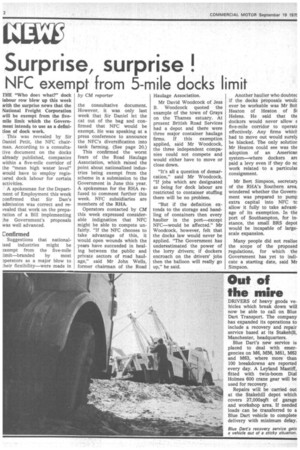Surprise, surprise !
Page 4

If you've noticed an error in this article please click here to report it so we can fix it.
NFC exempt from 5-mile docks limit by CM reporter THE "Who does what?" dock labour row blew up this week with the surprise news that the National Freight Corporation will be exempt from the fivemile limit which the Government intends to use as a definition of dock work.
This was revealed by Sir Daniel Petit, the NFC chairman. According to a consultative document on the docks already published, companies within a five-mile corridor of the "mean high water level" would have to employ registered dock labour for certain activities.
A spokesman for the Departnent of Employment this week ;:onfirmed that Sir Dan's admission was correct and revealed that work on the preparation of a Bill implementing :he Government's proposals was well advanced.
Confirmed
Suggestions that nationalised industries might be ?.xempt from the five-mile .imit—branded by most Dperators as a major blow to :heir flexibility—were made in the consultative document. However, it was only last week that Sir Daniel let the cat out of the bag and confirmed that NFC would be exempt. He was speaking at a press conference to announce the NFC's diversification into tank farming. (See page 20.) This confirmed the worst fears of the Road Haulage Association, which raised the point about nationalised industries being exempt from the scheme in a submission to the Government in June this year. A spokesman for the RHA refused to comment further this week. NFC subsidiaries are members of the RHA.
Operators contacted by CM this week expressed considerable indignation that NFC might be able to compete unfairly. "If the NFC chooses to take advantage of this, it would open wounds which the years have succeeded in healing between the public and private sectors of road haulage," said Mr John Wells, former chairman of the Road Haulage Association.
Mr David Woodcock of Jess B. Woodcock quoted the example of the town of Grays on the Thames estuary. At present British Road Services had a depot and there were three major container haulage firms. If this exemption applied, said Mr Woodcock, the three independent companies could not compete and would either have to move or close down.
"It's all a question of demarcation," said Mr Woodcock. "If jobs which are designated as being for dock labour are restricted to container stuffing there will be no problem.
"But if the definition extends to the storage and handling of containers then every haulier in the port—except NFC—would be affected." Mr Woodcock, however, felt that the docks law would never be applied. "The Government has underestimated the power of the lorry drivers; if dockers encroach on the drivers' jobs then the balloon will really go up," he said. Another haulier who doubtec if the docks proposals woulc ever be workable was Mr Bot Heaton of Heaton of Si Helens. He said that thE dockers would never allow z five-mile corridor to operatE effectively. Any firms whict had to move out would surely be blacked. The only solutior Mr Heaton could see was the adoption of an Americas system—where dockers are paid a levy even if they do nc work related to a particular consignment.
Mr Bert Simpson, secretary of the RHA's Southern area, wondered whether the Government was prepared to pump extra capital into NFC tc allow it fully to take advantage of its exemption. In the port of Southampton, for instance, the small BRS depot would be incapable of largescale expansion.
Many people did not realise the scope of the proposed regulations, for which the Government has yet to indicate a starting date, said Mr Simpson.
















































































































